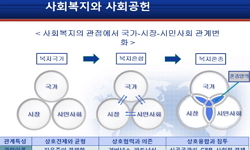In this study, the effect of foreign investors on corporate social responsibility was verified through the fulfillment of mandatory employment for the disabled. Assuming that foreign investors are not a homogeneous group, but may be heterogeneous depe...
http://chineseinput.net/에서 pinyin(병음)방식으로 중국어를 변환할 수 있습니다.
변환된 중국어를 복사하여 사용하시면 됩니다.
- 中文 을 입력하시려면 zhongwen을 입력하시고 space를누르시면됩니다.
- 北京 을 입력하시려면 beijing을 입력하시고 space를 누르시면 됩니다.

외국인투자자와 기업의 사회적 책임(CSR): 장애인 고용의무 이행을 중심으로 = Foreign Investors and Corporate Social Responsibility: Focusing on Mandatory Employment for the Disabled
한글로보기부가정보
다국어 초록 (Multilingual Abstract)
During 2015~2020, logit analysis was conducted on 479 manufacturing companies listed on the KOSPI market. The main results are as follows. First, it was found that the higher the share of foreign investors, the higher the likelihood of not fulfilling the mandatory employment for the disabled. Second, it was confirmed that foreign institutional investors with more than 5% of a company's shares had no significant impact on the fulfillment of mandatory employment for the disabled, while foreign investors with less than 5% of shares had a significant negative impact on the fulfillment of their employment obligations.
These results mean that foreign investors may have an incentive to suppress corporate social responsibility by recognizing them as a kind of cost, and foreign investors may have different effects on corporate management depending on the purpose or shareholdings. In other words, foreign institutional investors with more than 5% of shares in a company are usually strategic investors with a long-term shareholding period, who are likely to support corporate social responsibility. While since foreign investors with less than 5% are short-term and financial investors, it suggests that social responsibility activities without clear benefits can be recognized as costs and suppressed.
In this study, the effect of foreign investors on corporate social responsibility was verified through the fulfillment of mandatory employment for the disabled. Assuming that foreign investors are not a homogeneous group, but may be heterogeneous depending on ownership and investment purposes, it was divided into foreign institutional investors with more than 5% of a company's shares and foreign investors with less than 5% of shares to verify whether the influence on the company's social responsibility is different.
During 2015~2020, logit analysis was conducted on 479 manufacturing companies listed on the KOSPI market. The main results are as follows. First, it was found that the higher the share of foreign investors, the higher the likelihood of not fulfilling the mandatory employment for the disabled. Second, it was confirmed that foreign institutional investors with more than 5% of a company's shares had no significant impact on the fulfillment of mandatory employment for the disabled, while foreign investors with less than 5% of shares had a significant negative impact on the fulfillment of their employment obligations.
These results mean that foreign investors may have an incentive to suppress corporate social responsibility by recognizing them as a kind of cost, and foreign investors may have different effects on corporate management depending on the purpose or shareholdings. In other words, foreign institutional investors with more than 5% of shares in a company are usually strategic investors with a long-term shareholding period, who are likely to support corporate social responsibility. While since foreign investors with less than 5% are short-term and financial investors, it suggests that social responsibility activities without clear benefits can be recognized as costs and suppressed.
국문 초록 (Abstract)
본 연구에서는 외국인투자자가 기업의 사회적 책임 활동에 미치는 영향을 장애인 고용의무 이행을 통해 검증하였다. 외국인투자자가 동질적인 하나의 그룹이 아니라 소유지분과 투자목적...
본 연구에서는 외국인투자자가 기업의 사회적 책임 활동에 미치는 영향을 장애인 고용의무 이행을 통해 검증하였다. 외국인투자자가 동질적인 하나의 그룹이 아니라 소유지분과 투자목적에 따라 이질적일 수 있다는 가정하에, 특정 기업에서 5% 이상을 소유한 외국인 기관투자자와 5% 미만의 지분을 가진 외국인투자자로 나누어 기업의 사회적 책임 이행에 미치는 영향력이 상이한지를 검증하였다. 이를 위해 2015년~2020년 동안 한국거래소 유가증권시장(KOSPI)에 상장된 479개 제조기업을 대상으로 로짓분석을 수행하였으며, 주요 연구결과는 다음과 같다. 첫째, 외국인투자자의 지분율이 높을수록 장애인 고용의무를 이행하지 않을 가능성이 높음을 발견하였다. 둘째, 특정 기업에서 5% 이상의 지분을 보유한 외국인 기관투자자는 장애인 고용의무 이행에 별다른 영향을 미치지 않은 반면, 5% 미만 지분을 가진 외국인투자자는 장애인 고용의무 이행에 유의한 부정적 영향을 미침을 확인하였다. 이러한 결과는 외국인투자자는 기업의 사회적 책임 활동을 일종의 비용으로 인식하여 이를 억제하려는 동기를 가질 수 있으며, 외국인투자자는 하나의 동질적 그룹이 아니라 투자목적이나 투자 기간에 따라 기업 경영에 미치는 영향이 다를 수 있음을 의미한다. 즉, 특정 기업에서 5% 이상의 지분을 가진 외국인 기관투자자는 대개 주식보유기간이 긴 전략적 투자자이며, 이들은 장기적 관점에서 기업가치 제고를 추구하기 때문에 기업의 사회적 책임 활동을 지지할 가능성이 큰 반면, 5% 미만을 소유한 외국인투자자는 단기적이며 재무적 투자자이므로 뚜렷한 효익이 없는 사회적 책임 활동은 비용으로 인식하고 이를 억제할 수 있음을 시사한다.
동일학술지(권/호) 다른 논문
-
역할 스트레스원이 직장 내 무례 경험과 무례 가해에 미치는 영향: 외국계와 로컬 자동차기업 영업사원 간의 비교를 중심으로
- 한국국제경영관리학회
- 배준영
- 2023
- KCI등재
-
- 한국국제경영관리학회
- 박수황
- 2023
- KCI등재
-
- 한국국제경영관리학회
- 김성훈
- 2023
- KCI등재
-
전자상거래 라이브 커머스 특성이 중국 소비자의 충동 구매의도에 미치는 영향에 관한 연구: 가상촉각을 매개효과로
- 한국국제경영관리학회
- 추익민
- 2023
- KCI등재




 eArticle
eArticle






